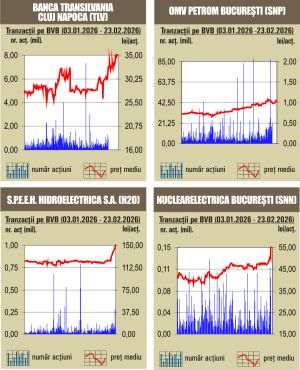După o pauză de aproape 50 de ani, când în toate ţările din fostul bloc de Est tranzacţiile bursiere au fost interzise, Bursa de Valori din Ljubljana a fost reînfiinţată în decembrie 1989, iar după mai mult de trei luni a început să funcţioneze în mod regulat.
Privind în ansamblu, dezvoltarea pieţei de capital slovene a coincis cu dezvoltarea Sloveniei şi aderarea acesteia la Uniunea Europeană. Ca în toate ţările foste comuniste, procesul de privatizare în masă a avut un rol esenţial în evoluţia bursei din Ljubljana. De asemenea, independenţa Sloveniei şi dezvoltarea sa ca stat independent, urmată de intrarea în Uniunea Europeană şi ulterior în zona euro, a reprezentat o etapă de excepţie, cu impact pozitiv asupra funcţionării pieţei de capital, conform celor prezentate pe site-ul bursei din Ljubljana.
În 2008, Bursa de Valori din Viena a achiziţionat 81,1% din bursa slovenă, iar ulterior, împreună cu bursele din Budapesta, Praga şi Viena, bursa din Ljubljana a început să opereze sub umbrela CEE Stock Exchange Group. La finele anului 2015, Bursa de Valori din Zagreb a achiziţionat integral acţiunile operatorului pieţei de capital slovene, fiind astăzi proprietarul bursei din Ljubljana.
• Bursa din Ljubljana este conectată la SEE Link, platformă ce facilitează tranzacţionarea valorilor mobiliare ale pieţelor din regiune
Cu toate că are una dintre cele mai ridicate valori ale PIB-ului pe cap de locuitor dintre ţările Europei Centrale şi de Sud-Est, atât din perpectiva suprafeţei cât şi a populaţiei, Slovenia este o ţară de dimensiuni relativ reduse, astfel încât piaţa sa de capital se află în categoria pieţelor de frontieră atât în ierarhia MSCI (la fel ca România) cât şi a FTSE Russell (unde noi suntem emergentă secundară).
Anul trecut, ponderea capitalizării companiilor locale în PIB era de 16%, conform datelor Băncii Mondiale, peste cea a României, de 10,3%, dar cu mult sub nivelul Poloniei, cea mai dezvoltată piaţă din zona noastră, care avea un raport capitalizare faţă de PIB de 29,9%.
La finele lunii august, capitalizarea bursieră a companiilor listate la bursa din Ljubljana era de 6,92 miliarde de dolari, circa o treime din evaluarea companiilor locale de la BVB, în timp ce valoarea tuturor obligaţiunilor listate era de 35,89 miliarde de euro, în mare parte obligaţiuni guvernamentale, conform datelor operatorului pieţei de capital slovene.
SBITOP este indicele companiilor de tip "blue-chip" al bursei din Ljubljana, fiind în prezent compus din acţiunile a nouă emitenţi. Acţiunile producătorului farmaceutic Krka au o pondere de 30,6% în coşul de acţiuni, cele ale companiei energetice Petrol de 20,4%, în timp ce titlurile NLB Banka reprezintă 17,5% din indice. Pe lângă SBITOP, există indicele SBITOP-TR, ce reflectă şi dividendele alocate de companiile din coşul de acţiuni.
De asemenea, bursele din Praga şi Zagreb au un indice comun de tip Total-Return, numit ADRIAprime, ce include companiile listate pe segmentul "Prime Market" al celor două burse.
The Securities Market Agency este entitatea, independentă, care supraveghează piaţa de capital din Slovenia, cu misiunea de a menţine o piaţă sigură, transparentă şi eficientă a instrumentelor financiare. Activitatea de compensare-decontare a tranzacţiilor, prestarea serviciilor de custodie şi menţinerea Registrului Central al deţinătorilor de valori mobiliare din Slovenia este asigurată de KDD - Central Securities Clearing Corporation.
Încă din decembrie 2016, bursa de valori din Ljubljana s-a alăturat platformei SEE Link, ce reprezintă o infrastructură regională prin care se facilitează tranzacţionarea valorilor mobiliare ale burselor din regiune. Practic, SEE Link integrează pieţele de acţiuni ale burselor ce au aderat la platformă, care însă rămân independente. În prezent, platforma SEE Link integrează bursele din Bulgaria, Macedonia şi Zagreb, fondatorii proiectului, la care s-au alăturat bursele din Belgrad, Ljubljana, Banja Luka şi Sarajevo.
• Atingerea unui raport al capitalizării în PIB de minim 30% - un deziderat al următorilor ani, conform Strategiei de dezvoltare a pieţei de capital din Slovenia
Ca în mai toate ţările din Europa Centrală şi de Sud Est, în Slovenia rolul pe care-l joacă piaţa de capital în finanţarea companiilor şi a economiei în ansamblu este mult mai redus decât cel al sistemului bancar.
Faţă de anul 2000, numărul companiilor listate a scăzut puternic, iar raportul capitalizare/PIB era de 14% în septembrie 2020, printre cele mai mici din regiune, conform proiectului "Strategia de dezvoltare a pieţei de capital din Slovenia (2022 - 26)", întocmit cu participarea activă a supraveghetorului pieţei şi a Ministerului Finanţelor.
Potrivit celor prezentate în raport, în următorii cinci ani ar trebuie să se creeze cadrul şi să se depună eforturi pentru ca piaţa de capital din Slovenia să ajungă un pilon important al dezvoltării economice a ţării, cu raport al capitalizării în PIB de cel puţin 30%, în condiţiile în care media UE era, în septembrie anul trecut, de 81%.
Atingerea statutului de piaţă emergentă în ierarhia furnizorilor cheie de indici până în 2025, reforma sistemului de pensii, sporirea alfabetizării financiare şi accentul pe elemente legate de sustenabilitate sunt alte ţinte prezentate în raport.
Totodată, se menţionează crearea unei pieţe active de Private Equity, care să reprezinte circa 0,5% din PIB până în 2026, în linie cu media UE de anul trecut.
----------------------------------
• The Slovenian stock market - milestones and prospects
The Zagreb stock exchange fully owns the Ljubljana stock exchange
Capitalization of issuers of 16% of the GDP, last year, compared to 10.3% in Romania
After a break of nearly 50 years, when stock trading in every country in the former Eastern block had been banned, the Ljubljana stock exchange was recreated in December 1989, and after more than three months it began operating regularly.
Looking at it overall, the development of the Slovenian capital market has coincided with the development of Slovenia and its accession to the European Union. Like in most communist countries, the mass privatization process played an essential role in the evolution of the Ljubljana exchange. Also, the Slovenian independence and its development as an independent state, followed by the access in the European Union and later in the Eurozone, has represented an exceptional stage, with a positive impact on the functioning of the stock market, according to the things presented on the site of the Ljubljana exchange.
In 2008, the Vienna stock exchange acquired 81.1% of the Slovenian exchange, and later, together with the exchanges of Budapest, Prague and Vienna, the Ljubljana exchange started operating under the umbrella of CEE Stock Exchange Group. At the end of 2015, the Zagreb Stock Exchange fully acquired the stocks of the Slovenian stock market operator, and it is presently the owner of the Ljubljana exchange.
• The Ljubljana exchange is connected to SEE Link, a platform which facilitates the trading of securities from the region's markets
Even though it has one of the highest GDP per capita among the countries of Central and Eastern Europe, both in terms of its surface and its population, Slovenia is a country that has relatively small country, meaning its stock market is in the frontier market category in the MSCI chart (like Romania) as well as in FTSE Russell (where Romania is rated as secondary emerging market).
Last year, the weight of the capitalization of local companies in the GDP was 16%, according to data of the World Bank, above Romania's 10.3%, but far below Poland, the most developed market in our area, which had a capitalization/GDP ratio of 29.9%.
At the end of August, the stock market capitalization of companies listed on the Ljubljana stock exchange was 6.92 billion dollars, about one third of the valuation of local companies on the BSE, while the value of all the listed bonds was 35.89 billion Euros, mostly government bonds, according to data of the Slovenian market operator.
SBITOP is the index of Blue Chip companies listed on the Ljubljana Stock Exchange, which currently comprises nine companies. Shares of pharma company Krka account for 30.6% of the index, while those of energy company Petrol represent 20.4%, while NLB Banka titles amount to 17.5% of the index. In addition to SBITOP, there is also the SBITOP-TR index, which further accounts for the dividends paid out by companies included in the index.
Also, the Prague and Zagreb exchanges have a shared Total-Return index, called ADRIAprime, which includes the companies listed on the "Prime Market" segment of the two exchanges.
The Securities Market Agency is the independent entity that oversees the Slovenian capital market, with the mission to preserve a safe, transparent and efficient market for securities. The clearing and settlement activity, the providing of custodian services and the maintaining of the Central Registry of the securities in Slovenia is provided by KDD - Central Securities Clearing Corporation.
Since December 2016, the Ljubljana exchange has joined the SEE Link platform, which represents a regional infrastructure which facilitates the trading of securities on the exchanges in the region. Essentially, SEE Link integrates the stock markets which have joined the platform, which however remain independent. The SEE Link platform currently integrates the exchanges of Bulgaria, Macedonia and Zagreb, which were the founders of the project, which was joined by the exchanges of Belgrade, Ljubljana, Banja Luka and Sarajevo.
• Reaching a minimum ratio of 30% of the capitalization to the GDP - a goal for the next years, according to the strategy for the coming years, according to the Development stra- tegy for the stock market in Slovenia
Like in most countries in Central and South East Europe, in Slovenia the role that the stock market plays in the funding of companies and of the economy as a whole is far lower than that of the banking system. Compared to 2000, the number of listed companies has dropped significantly, and the capitalization/GDP ratio was 14% in September 2020, among the lowest in the region, according to the project "The strategy for the development of the Slovenian stock market (2022 - 26)", drawn up with the active involvement of the market regulator and of the Finance Ministry.
According to the data presented in the report, in the coming five years the framework would have to be created and effort should be made for the Slovenian stock market to become an important pillar of the country's economic development, with a capitalization/GDP ratio of at least 30%, as the EU median was 81% in September last year.
The reaching of the emerging market status in the hierarchy of the key index providers by 2025, the reform of the pension system, the increase of financial literacy and the emphasis on the sustainability related elements are other goals presented in the report.
Also mentioned is the creation of an active Private Equity market, that would represent about 0.5% of the GDP by 2026, in line with the EU median last year.
























































